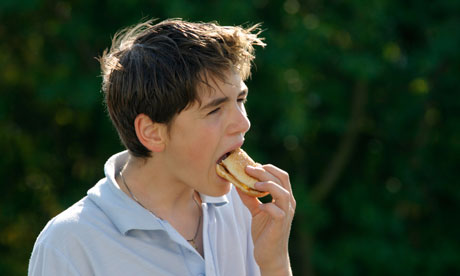
The problem: A recent national survey shows that teenagers don't eat enough fruit and vegetables (one in 13 eats the recommended five a day), scoff too much saturated fat and don't get enough iron and calcium. But there are so many battles you can have with your teenager – can you face a food fight too? And what if, by focusing on food, you manage to tip your teenager into an eating disorder?
Food is the fuel that teenagers grow up on so of course we should worry – even if many of us ate just as badly when we were teenagers.
Half of all teenage girls diet before the age of 14. They'll complain that their thighs are chubby and that other girls eat less and are thinner. They may start faddy diets or refuse red meat and regular meals. When they say they had a big lunch at school, who knows if they're telling the truth?
Girls' eating habits are worse than boys' because of the pressure to be slim. So when your teenage girl gets picky you may panic. But do you hope the problem will go away or butt in?
The solution: You do need to act but calmly and objectively. What you need to have done for years is to have been positive about your own body image and not to have moaned about how fat you are and how much you need to lose weight. Teenage daughters need positive role models, not mothers who themselves have unhealthy attitudes towards food. The longer food issues go unsaid, the harder it is to address them. If you think your teenager is cutting out food groups or skipping meals, talk about it, otherwise every meal will become a battlefield. Teenagers may not realise if they're crossing a line between weight control and an eating disorder.
Eat together healthily as a family. Let people serve themselves, but if your child is not eating much, remind them they need to eat to be healthy and suggest they have a bit more. If you think your teenager is losing weight then weigh them and work out their body mass index (BMI) – there are calculators online. Anything under 17.5 as a result of dieting indicates an eating disorder. If they have a normal BMI then check again in a month.
Teenagers should gain weight as they grow up. If they keep losing weight, they need to get professional help (start with your GP). If they want to lose weight and there's objective evidence (from their BMI) that they need to, you should also get external advice. It may be tempting to brush faddy diets off as part of growing up, but encouraging healthy eating is as much the job of a parent as getting them out of bed every day.
• This article was amended on 27 July. The original incorrectly referred to teenagers scoffing too much "unsaturated" fat.

